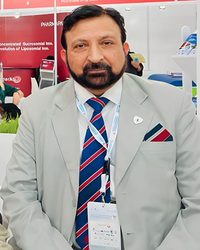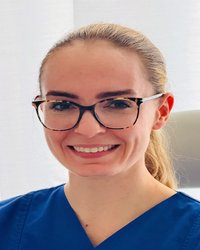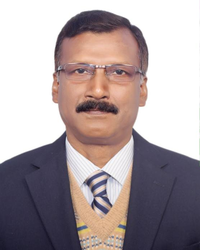SPEAKERS
Meet Global Speakers!

Daniel Gagiannis
Department of Pulmonology, Ulm, Germany
Dr. Daniel Gagiannis studied medicine at the Charité Berlin from 2000 to 2005 and at the Ruprecht-Karls-University Heidelberg from 2005-2006. His doctorate was dedicated to the topic "Biochemical in vivo modulation of sialoglycoconjugates and their biological consequences". It was the foundation for his further active research in the field of biochemical engineering, particularly with regard to the influence of glycostructures on malignant, infectious and rheumatological disease processes. After training as a specialist in internal medicine at the Bundeswehr Hospital in Ulm and an interim period as a military doctor at the Tornado base in Untermeitingen, he completed further training in pneumology at Ulm University Hospital from 2013 to 2016. Daniel Gagiannis then took over as Head of Pneumology at the Bundeswehr Hospital in Ulm. His clinical care focuses in particular on thoracic oncology, interstitial lung diseases and infectious diseases of the lungs. His habilitation was dedicated to the pathomechanisms of COVID-19 and its sequela PASC.

Mohammad Kamil
Director General,Lotus Holistic Institute
Dr. Mohammad Kamil, M.Sc.; M.Phil.; Ph.D.; D.Sc.; Chartered Chemist(U.K.) and
Fellow Royal Society of Chemistry (London), has worked in various capacities. As In-charge -
Drug Standardization lab. CCRUM, Ministry of Health -India, Associate Professor at Hamdard
University, India; Professor & Head Department of Pharmacognostic Science, Zayed Complex
for Herbal Research & Traditional. Medicine, Ministry of Health, UAE (1996-2010); Head
TCAM Research at Department of Health, Abu Dhabi (2010-2020). Presently working as
Director General, Lotus Holistic Healthcare Institute, Abu Dhabi, UAE since 2021. He is heading
the Scientific Committee for the Sheikh Zayed International TCAM Awards.
Recipient of many honours and awards lastly received Sheikh Zayed International Award in
Traditional Herbal Research in 2020.Produced 20 Ph. D. and M.Phil. students besides guiding
a huge number of M. Sc. dissertations and 40 Interns. More than 780 research papers with
more than 8000 citations.

Josefine C. Baudrexl
Department of Pulmonology, Ulm, Germany
Dr. Josefine C. Baudrexl studied medicine at the Ludwig Maximilian University of Munich alongside her military training as a medical officer in the German Armed Forces and began her specialist training as an internist at the Bundeswehr Hospital in Ulm in 2020. In March 2021, she successfully completed her doctoral thesis on "Facets of sexual self-image in association with the sexual behavior and sexual identity of 45-year-old men in Germany". From 2022 to 2025, she completed a career-relevant assignment in military medical care at a regional medical facility of the German Armed Forces in Erfurt. As part of this, she also took part in a military operation in Jordan lasting several months in 2024. Since 2025, she has been undergoing specialist training as a pulmonologist at the Bundeswehr Hospital in Ulm. In addition to her position as coordinator of the lung cancer center, she is scientifically dedicated to the prevention and rehabilitation of smoking- and infection-associated secondary diseases.

Michelle Perkins
University of Georgia
Michelle Perkins is an educator, counselor, certified professional life coach, business owner,
and social impact leader with a strong background in criminal law, juvenile justice, and
education administration. She is a graduate of Georgia Southern University and the founder of
Promote Youth and Family Support, Inc., operating under the umbrella of I AM HER Healing
Academy—a nonprofit organization dedicated to helping women become Healed,
Encouraged, and Restored.
With over 30 years of experience in education, advocacy, and behavior intervention, Michelle
has devoted her career to empowering youth and women to live purposefully and mindfully.
Through her coaching and academic collaborations, she continues to bridge the gap between
research, healing, and empowerment by equipping young women with tools for
self-awareness, balance, and sustainable personal growth in both digital and real-world spaces.

Pranab Behari Mazumder
Assam University
Dr. Pranab Behari Mazumder is a Professor in the Department of Biotechnology and Dean of the Har Govind Khorana School of Life Sciences at Assam University, Silchar. He holds a Ph.D. in Biotechnology from Gauhati University and has completed post-doctoral research in Micro RNA and TALEN Cloning at the University of Louisville, USA. With extensive teaching experience since 1994, he has taught Genetics, Molecular Biology, Microbiology, and Plant Biotechnology, and has guided numerous PG, M.Phil., and Ph.D. scholars. A recipient of several prestigious awards, including the DBT Overseas Associateship and the National Scholarship Program of the Slovak Republic, he has completed seven major research projects and currently leads one ongoing project. His research focuses on Biomedicine and Natural Products, Plant–Microbe Interaction Signaling, and Plant Tissue Culture. Prof. Mazumder has published 115 research papers, two books, and twenty book chapters, and has chaired twenty-nine national and international seminars. He also serves as a Visiting Professor at the University of Louisville, USA.

